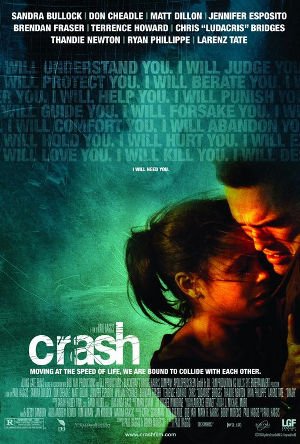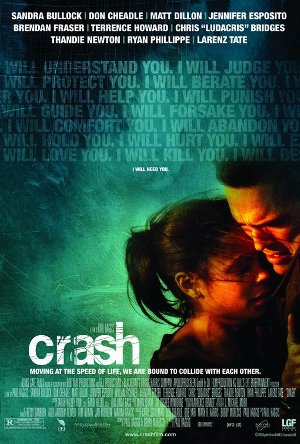xXx is for exXxtremely bad.
Since audiences have shown Hollywood that even the most ridiculously inept drivel can pass as quality action fare, there’s no doubt that this cinematic train wreck will probably spawn yet another sequel of equally diminished return. Fans of incessantly awful cinema might find a timeless gem here, but only after a copious amount of heavy, heavy drinking and several swift punches to the skull.
xXx: State of the Union
Negative Stars
Lest it be thought that the following review is the work of some unabashedly elitist movie snob, let me say this: I absolutely adore action flicks. Bullets, grim heroes, and very large explosions tickle my fancy in ways even the greatest of dramatic works can’t achieve. Give me a beer, some popcorn, and some needlessly violent gunplay and I am one very happy monkey indeed. Hell, I even enjoyed The Rundown, and that starred Seann William Scott, an actor I would happily see brought before the International Court for crimes against humanity.
 |
| Oh, there but for the Grace of Vin Diesel go thee |
The original xXx was made in a fairly callous attempt to kick the spy genre firmly away from its tuxedo-clad and upscale roots. Trading upper class education and high society for eXtreme sports and Hollywood envisioned street smarts, Vin Diesel’s growly charisma managed to give the film enough charm to keep it from being just a moronic 2 hour exercise in blowing stuff up.
Since the original film was a fairly successful endeavor, it is safe to say that the only thing that would have prevented this sequel from being made would have been the utter destruction of our universe, and even then it’d have a 50/50 chance of release. Hollywood proved long ago that it’s capable of existing in an airless vacuum.
Sadly, trading in Vin Diesel’s diminishing star power for the long-past faded Ice Cube is akin to trading your RC Cola for a Shasta, but in a move that should surprise only the most mind-bogglingly naïve moviegoer, that’s exactly what the makers of xXx: State of the Union have done for this incomprehensibly stupid action sequel.
This time around Ice Cube plays a former Navy Seal who is tapped to take the coveted title of xXx when a NSA facility in Virginia is attacked by unknown assailants. A returning Samuel L. Jackson, who must have some serious investments in the telecom industry, phones in his trademark performance as the gruff and wise intelligence operative who taps the incarcerated Cube to save the current slate of old, white men. Nona Gaye and Xzibit play the shady characters from Ice Cube’s mean streets past, while Michael Roof plays the tragically unhip Q to Cube’s Bond. Rounding out this sorry lot is a partially effective Scott Speedman and Willem “I can’t believe I’m actually doing this” Defoe.
Though the film is supposed to be a race-against-time action film about stopping a political coup (and settling an old score), the film takes so many ridiculous turns that it’s akin to reading Mad Libs submitted by local sanitarium patients. Plot and logic holes large enough to drive a jacked up and armored Ford Truck through take a film that could be dumb to a level of medical retardation. Remove the budget and big special effects, and replace Ice Cube with Lorenzo Lamas and xXx: State of the Union would be completely at home alongside the slew of arrestingly stupid action films that peppered cable movie channels throughout the late 80s and early 90s. Rest asssured, those of you unwilling to pay 9 bucks to see it on the big screen will inevitably find it sandwiched between Coors and Axe ads on Spike TV.
If nothing else, perhaps film historians will one day look back and recognize State of the Union as the film that single-handedly set back race relations in America a good 15 years, as its characters are uniformly do-gooder thugs and back stabbing blue-bloods (An important lesson learned in the film is “don’t trust rich white chicks”). The filmmakers attempt a couple of clumsy stabs at showcasing the economic and social gap of Washington elites and the lower-class citizens who provide their basic services, but such moments are played for easy laughs rather than insightful commentary. Although on the surface a pro-American film, this mindless action film treads a pretty uneven political line. Chock full of class-warfare and sniping, what starts out as a PCP addled liberal conspiracy freak’s cautionary tale feels more like a Reagan era shoot-‘em-up with it’s main character’s motivation rooted more in vengeance than any sense of civic duty. Though conservative filmgoers will probably be a bit put off by the U.S. Army being portrayed as about an effective military force as Darth Vader’s Imperial Stormtroopers (who by all rights must surely be the Washington Generals of the cinematic military canon.)
Since audiences have shown Hollywood that even the most ridiculously inept drivel can pass as quality action fare, there’s no doubt that this cinematic train wreck will probably spawn yet another sequel of equally diminished return. Fans of incessantly awful cinema might find a timeless gem here, but only after a copious amount of heavy, heavy drinking and several swift punches to the skull.
xXx is for exXxtremely bad. Read More »


 Racism is a difficult subject to broach cinematically. It’s all too easy to reduce it’s complexities and ignore the underlying reasons for racial tensions all together. Pithy moments of clarity and harsh realizations may make for good viewing, but they hardly touch on the lasting and deep seated effects of our prejudices. Paul Haggis (screenwriter of Million Dollar Baby) makes his directorial debut with Crash, a sprawling look at the seemingly endless well of racism in L.A., but for all its multiple storylines and enlightened moments all that’s left in the end is the idea that deep down we’re all just fundamentally damaged beyond repair, just simmering until that one moment brings our inner racist to the forefront.
Racism is a difficult subject to broach cinematically. It’s all too easy to reduce it’s complexities and ignore the underlying reasons for racial tensions all together. Pithy moments of clarity and harsh realizations may make for good viewing, but they hardly touch on the lasting and deep seated effects of our prejudices. Paul Haggis (screenwriter of Million Dollar Baby) makes his directorial debut with Crash, a sprawling look at the seemingly endless well of racism in L.A., but for all its multiple storylines and enlightened moments all that’s left in the end is the idea that deep down we’re all just fundamentally damaged beyond repair, just simmering until that one moment brings our inner racist to the forefront.

 Intertwining tales of violence and bubbling racial tensions crash into each other as residents of L.A. deal with issues of hate, bigotry, and racism that present themselves sometimes subtly and sometimes not-so-subtly throughout the course of the film. Crash tries to show how many people live their lives with certain ideas and notions that they might not even be aware of until they are forced to confront them. Many people won’t like the film for it’s bleak look at the human condition, but in examining this small group of people the film works for me as it shows how easily ill-will and prejudice can be passed on from one person to the next through angry or hateful exchanges.
Intertwining tales of violence and bubbling racial tensions crash into each other as residents of L.A. deal with issues of hate, bigotry, and racism that present themselves sometimes subtly and sometimes not-so-subtly throughout the course of the film. Crash tries to show how many people live their lives with certain ideas and notions that they might not even be aware of until they are forced to confront them. Many people won’t like the film for it’s bleak look at the human condition, but in examining this small group of people the film works for me as it shows how easily ill-will and prejudice can be passed on from one person to the next through angry or hateful exchanges.